Paul Kent: How Sia Soliola made the Canberra Raiders a better club
Ricky Stuart loves his players but none more so than the recently retired Sia Soliola, a kind, generous man who is the antidote to the modern indulgence of current players, writes PAUL KENT.
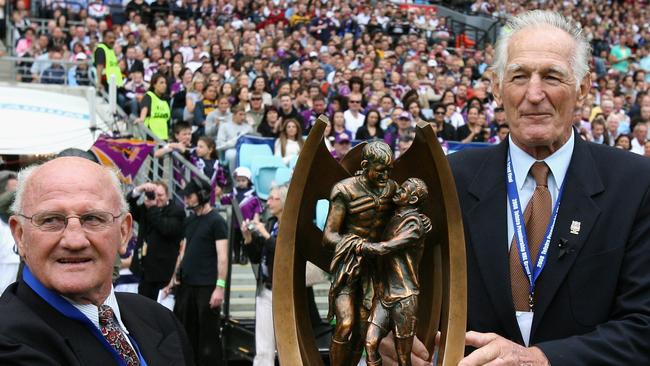
NRL
Don't miss out on the headlines from NRL. Followed categories will be added to My News.
Love affairs are not a common storyline around the NRL, with everyone being so masculine and all, but every now and then a player will seep into the psyche of an NRL coach and, no matter how often he tells himself it is bad for his health, he can’t help but fall in love with the guy.
For Ricky Stuart, that player was Sia Soliola.
Stuart signed him up as a young man when he coached the Sydney Roosters in 2005 and then somewhere in his first year at Canberra in 2014, he realised what the club was missing and so he worked on getting Soliola back from the English Super League.
Kayo is your ticket to the best local and international sport streaming Live & On-Demand. New to Kayo? Start Your Free Trial >
“I needed a leader,” he says. “And he was a leader among men, on and off the field.”
Stuart brought Soliola back to Australia where he was everything he remembered and more.
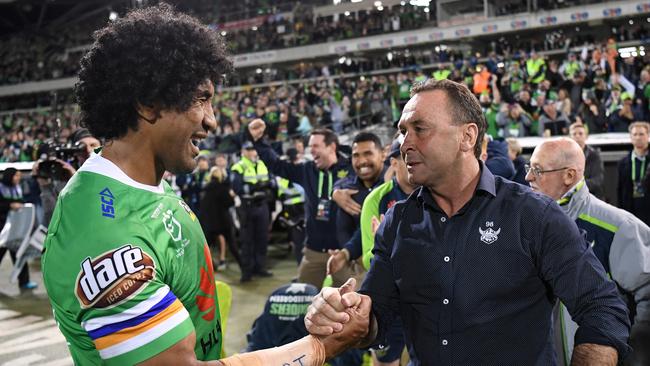
“He’s a provider,” he says. “He provided energy and he provided the aggression we needed.”
More than that, Soliola immediately began investing in the people of Canberra.
That generous bone was always inside him, a trait inherited from his late mother Fialelei.
But when he was playing at St Helens, a small town with a big football team, Soliola saw up close what teams mean in their community and he wanted Canberra to experience that, too, and so he began to give. For no other reason than he wanted to.
Last week’s column, documenting Penrith’s extravagant grand final celebrations, stirred a few to action this past week.
The groundswell of opinion led the NRL to get involved and spend all week investigating the Panthers, who continue to find excuses like they have all season.
For many, it was too much.
Sia Soliola is the antidote to this modern indulgence.
The stories about Soliola’s generosity of spirit are everywhere.

There was the time a woman flagged him down, distraught. Her car was broken into and among the items stolen were toys for her children.
Soliola drove her around hoping the toys might be thought useless by the thieves and tossed aside. When all they recovered was scraps of paper the toys were wrapped in, Soliola gave her money for new toys.
He attended a fundraiser one night and, after the event, stayed around until 1am to help stack the chairs.
He shaved his hair for charity, raising $50,000. He is an ambassador for children with Angelman Syndrome, a genetic disorder.
For years, every Monday morning, Soliola donated his time at the Early Morning Centre soup kitchen, scrubbing pans, making tea, sweeping floors, while cooking breakfast for the homeless.
He offers no explanation more noble than saying he simply enjoys it.
“I just enjoy being around people,” he says.
“I always saw myself as a person before a footballer. Whether I was playing football or doing something else, I feel this is something I would have gravitated towards anyway.”
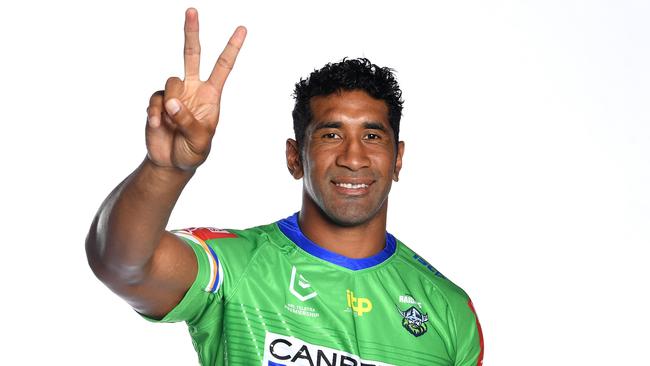
Stuart can’t tell you the amount of tickets he has organised for the homeless, simply so they can have a little normality in their lives, to go watch the Raiders play.
So naturally when Covid shut down the city and Soliola was forced into the NRL bubble some of them missed him so much they trekked all the way out to the Raiders’ training facility to say hi through the fence.
He can’t tell you how often they will be somewhere talking and someone will attract Soliola’s attention and he will break from conversation mid-sentence to bend to talk to a child, or to tell a Raiders fan he understands their frustration and listens to all they have to say.
He listens until they have exhausted their thoughts.
For years now Stuart has been waiting, not wanting it to happen but ready nonetheless, for when Soliola would retire.
It all began about six years ago, in fact, when Stuart was in Seattle and allowed entry to the Seahawks’ inner sanctum. Pete Carroll, the Seahawks coach, allowed Stuart full access.
As he walked through the facility one morning he came upon a darkened room. Out of the darkness came a voice.
“How you doing?”

Somewhere in the darkness was a man who was soon revealed as the Seahawks welfare officer. Why his office was dark is anybody’s guess, but it certainly made for lasting impressions. Anyway, Stuart walked in and sat down.
Every day the welfare officer sat in his office, he explained, and as the players arrived for training they would all have to also walk past his door.
He became familiar with their patterns. Some guys liked to stop and talk, others said hi and kept moving and others offered no more than a grunt.
The problem, he told Stuart, was when they broke their pattern.
And the more the man talked the more Stuart realised the importance of catching problems early, and for the need to have someone there for it, and the more he thought about it the more another thought crystallised sharply in his mind: “This is Sia Soliola when he’s done.”
And so when the season ended Sia Soliola, after 357 first-class games, retired from the game and the Raiders refused to let him be lost to them.
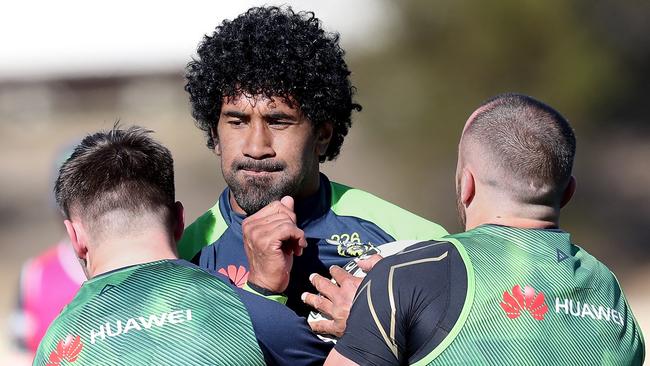
The Raiders offered him a job as their welfare and wellbeing manager, the kind of role that was being done in a dark room in Seattle.
He will work with the young recruits to the club, find them places to live and jobs to supplement their contracts, and he will talk to them because that is what he loves, and the Raiders know that with Soliola these young men are in no better hands.
Officially, he starts work on November 1, the start of the NRL financial year.
But this week he walked into the Raiders office ready for work, for when the players begin coming back for pre-season training.
“He has improved our club,” Stuart says. “I can’t say enough about him.”
Then he pauses.
“The boys call him ‘Uncle’,” he says, “which speaks for itself.”
SHORT SHOT
Sometimes, a time machine would be nice.
There was a time when it would have been a small sacrilege to suggest the Melbourne Cup would fade from the public conscience but with each year, by one small degree, Racing Victoria is ensuring the Cup is not what it used to be.
If we could climb into our time machine, would The Everest be the dominant race in Australia?
It is not as crazy as it sounds.
While the internationals were supposed to open the Melbourne Cup and put it on the world stage, the opposite is happening within Australia.
Every year the international raiders land, some don’t even race now before getting into the gates for the Cup, and then they go out, one of them wins the Cup, and they all head home.
Sometimes the trainers don’t even come, sending their staff to handle Cup preparations.

It is impossible to do form around the Cup and the whole magic it was built on, that the race was a handicap where anybody was a chance to win, or to own a Cup runner, has faded as the handicappers condensed the weights to keep the internationals happy.
Mostly, the heartwarming backstories that the Cup was built on have disappeared, replaced by rich owners and satellite trainers on hit-and-run missions.
Bart Cummings noticed it before anyone but his opposition to it was portrayed as Cummings being selfish, unprepared to share the race with the world.
The best way the local trainers have found to compete is to head overseas and buy their own import, which Gai Waterhouse proved in 2013 when she bought Fiorente specifically to win the Melbourne Cup. But that’s just more of the same.
Meanwhile, The Everest, which runs on Saturday at Randwick, continues to build, both in terms of recognition and prestige.

Special trait installs Provan at game’s pinnacle
After he won his 10th and last premiership Norm Provan was stretched out in a bath in the Sydney Cricket Ground dressing room, a few people surrounding him.
He had announced he was retiring after the grand final but nobody was quite sure he would. He had retired the previous year and maybe once or twice before that, but, as he lazed in the bath, retirement was again the conversation after the Dragons had beaten South Sydney 12-8.
“Oh, I am glad,” he said. “That match was the one I wanted.”
Provan was the only player to play in what was then all 10 of the Dragons premierships, where for the last four he was captain-coach.
He was 33 and each year was finding it tougher to mentally get up for the game.
And so with this victory he stepped out of the bath and into retirement and went on to become an icon of rugby league.
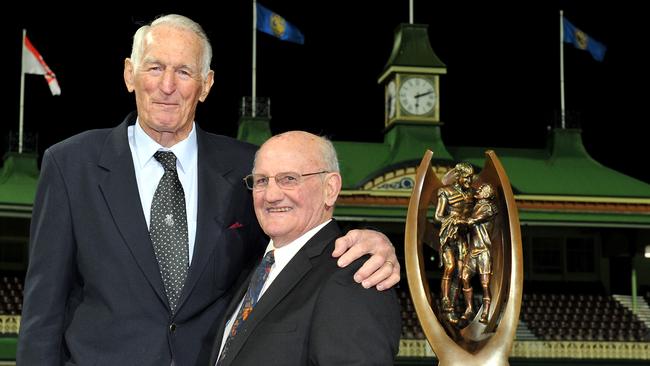
“We have lost one of the legends of our game,” ARL Commission chairman Peter V’landys said.
He was an emblem for the game’s greatness.
A man of principle and quiet dignity, who stuck so rigidly to his basic, simple principles, they carried him all the way to the top.
Norm Provan, who passed away Wednesday night at 89, had a presence about him that he carried to the very end.
His teammates’ respect for him bordered on reverence.
Years after he retired, whenever voting was opened to name a new Immortal, Provan was always debated.
His record in the game, quite simply, will never be repeated. Those 10 straight premierships, which became 11 for the Dragons the year after he retired, were a world record that no other sporting team has come close to repeating.
The argument was that anyone with such a record could not be denied the game’s highest honour. Especially given Provan was instrumental in that success.
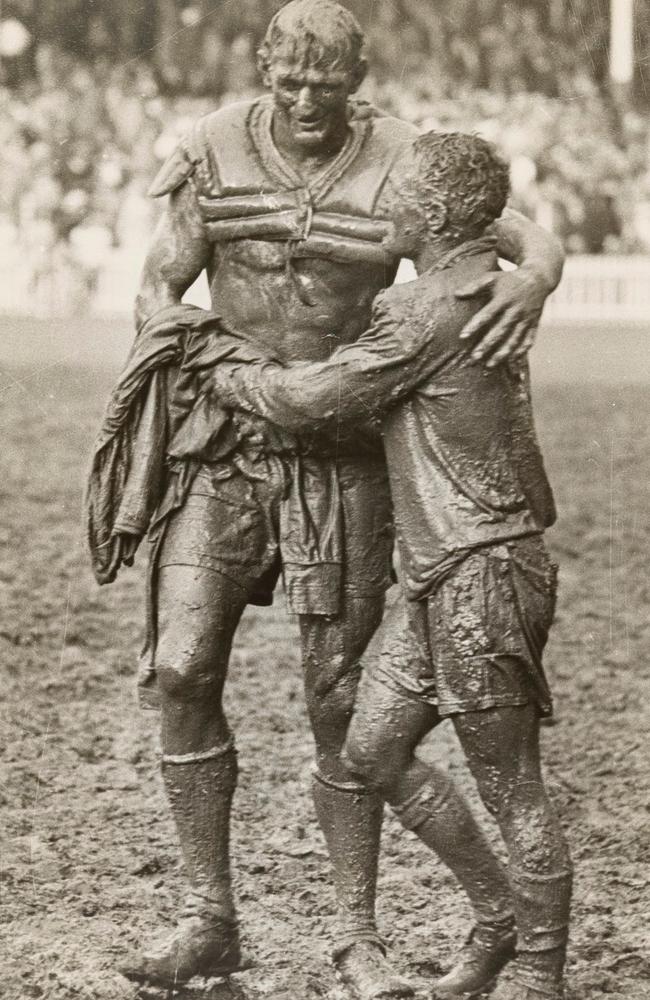
And so as Immortals themselves, Provan’s teammates John Raper and Graeme Langlands were always among those assembled to select the next Immortal.
“Sticks!” Langlands would bellow.
He was adamant it had to be Provan.
To understand why was to not only understand Provan, and the man he was, but also the men that he helped them become.
Provan was like none of the Dragons of folklore.
He was not exactly a teetotaller, but as near as you can get to it. He simply did not like the taste of alcohol, once saying he enjoyed the first half of a glass of beer but could barely stand the taste after that.
As everybody knows, though, it was a complaint never heard from any of the other Dragons.
Raper was rugby league’s original wild child. When Langlands and Billy Smith joined St George in 1963 they also soon fitted in, the Dragons having the tremendous ability to be able to party as well as they played.
Yet Provan had a command over them that was underpinned by strict discipline and absolute fairness.
He was graded with the Dragons in 1950 and played first grade the following year, going on to play 15 seasons and 256 first grade games for the club, which was a record that stood until 2012.
Everywhere Provan went he seemed to set records.
His leadership qualities were obvious so when Ken Kearney retired as captain-coach Provan, by then an international, was the logical replacement.
Provan had a standing within the team that allowed him to corral the likes of Raper and Langlands and also somehow keep the egos in check to continue their success.
With three future Immortals in the team, Reg Gasnier also there, and a stack of internationals, it was his unbending sense of fairness that cut through.
When Ian Walsh joined the Dragons, for instance, he was already an international hooker but Provan played him in second grade or at prop in his early days at the Dragons.
Peter Armstrong was the hooker and, as Provan told Larry Writer years later in Never Before, Never Again, Armstrong “had done nothing to warrant being dropped”.
Walsh, Provan said, had to earn his way into the starting side.
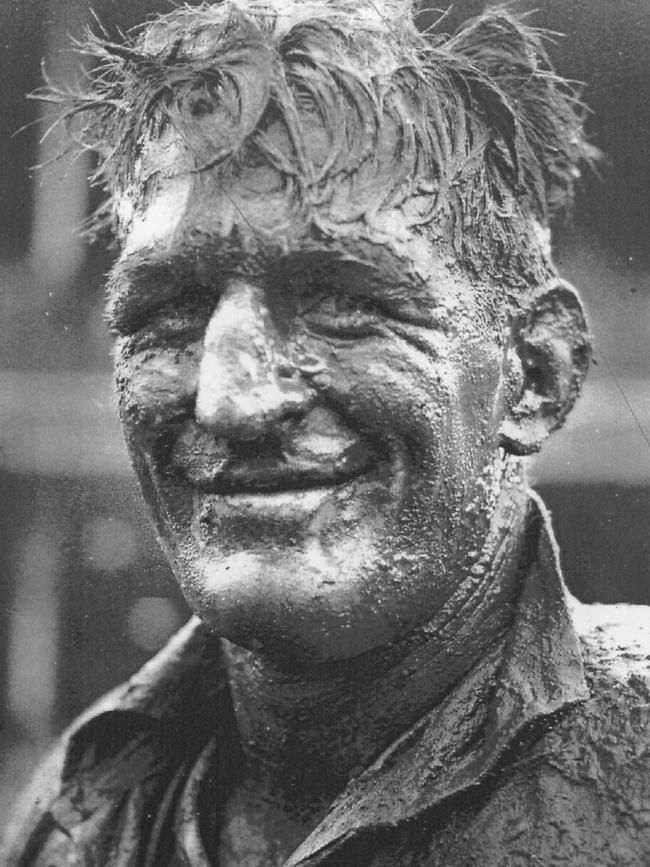

It was a principle grounded in absolute fairness, as he lived his life.
They were qualities the likes of Raper and Langlands could only respect, and for which they eventually came to love him for.
He led them on the field and they followed him off it.
Walsh would eventually replace Provan as captain-coach in 1966 but wrote in his autobiography that he found Provan intimidating as his captain-coach.
“I suppose I can be, but it’s never anything personal,” Provan told Writer.
He understood men and their motivations.
Years later when he coached Parramatta the Eels had an end of season trip to New Zealand, where there were games planned, and Provan saw them not as a holiday but a springboard into the following season.
Bob O’Reilly, who had a casual approach to training, to be polite, told Provan he did not want to go. Provan explained why it was crucial he did.
“Sticks, I’ll do a deal with you,” O’Reilly finally said. “I’ll go on the trip if you promise to play half a game.”
Provan agreed and forgot all about it until the last game of the tour, when O’Reilly walked in at halftime and peeled off his sweaty jersey and tossed it at Provan’s feet.
“Your turn Sticks.”
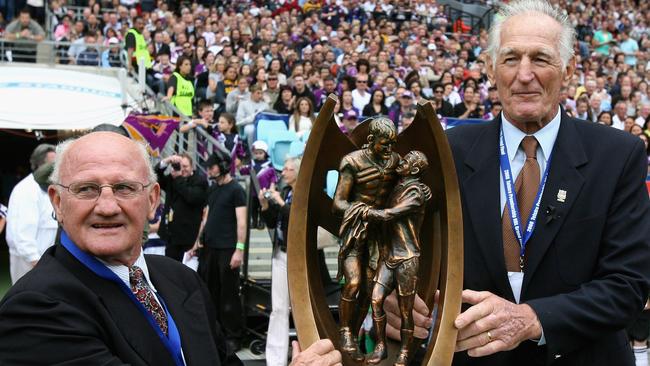
Provan played the second half and scored a couple of tries.
“I didn’t exactly feel 22 again, but I didn’t feel 44, either,” he said.
It was a love for the game that endured to the end.
Provan was named in the second-row when the NRL announced its Team of the Century in 2008, celebrating the game’s first 100 years.
By then he was already in the NSW Rugby League Hall of Fame and the Australian Rugby League Hall of Fame. He would be inducted into the Sport Australia Hall of Fame in 2015.
Each strengthened the argument to name him as an Immortal.
Then in 2018 the NRL announced a new class of Immortals would be named.
Provan’s name was among those listed and, as part of the new rules around the Immortals, it was announced this would be his last opportunity.
By then it was all about old men and their sunsets.
Langlands was dead, having passed earlier that year. Raper was in ill health, and so was Provan, slowly succumbing to the effects of dementia.
They had one last chance to get it right, and thankfully they did.





